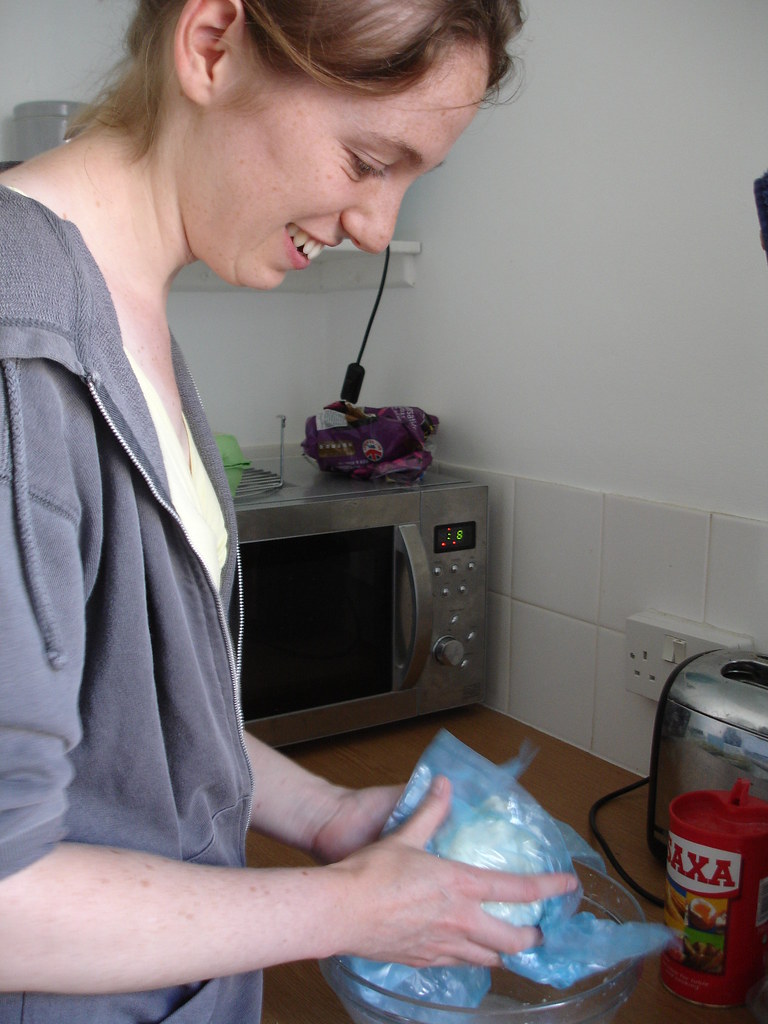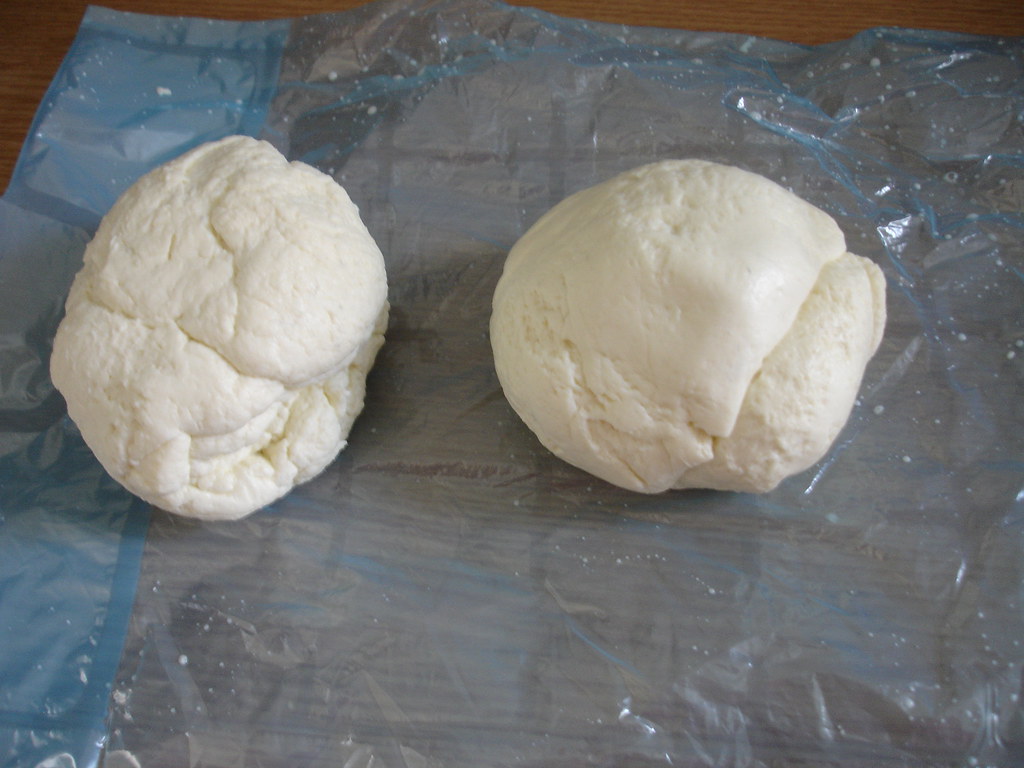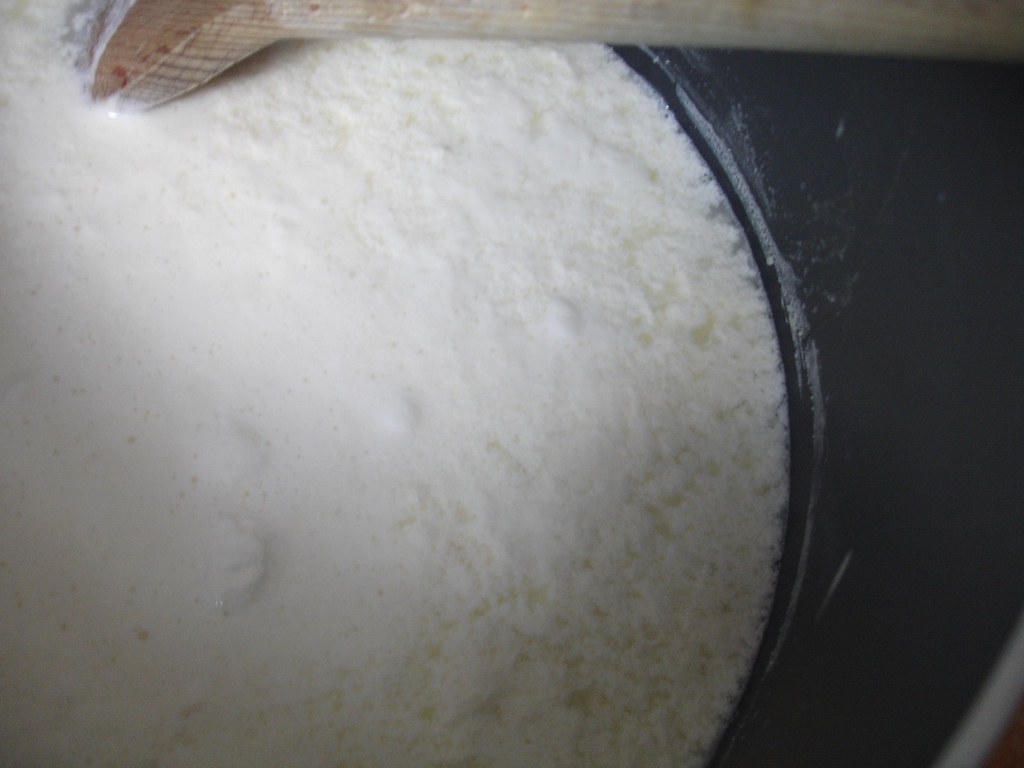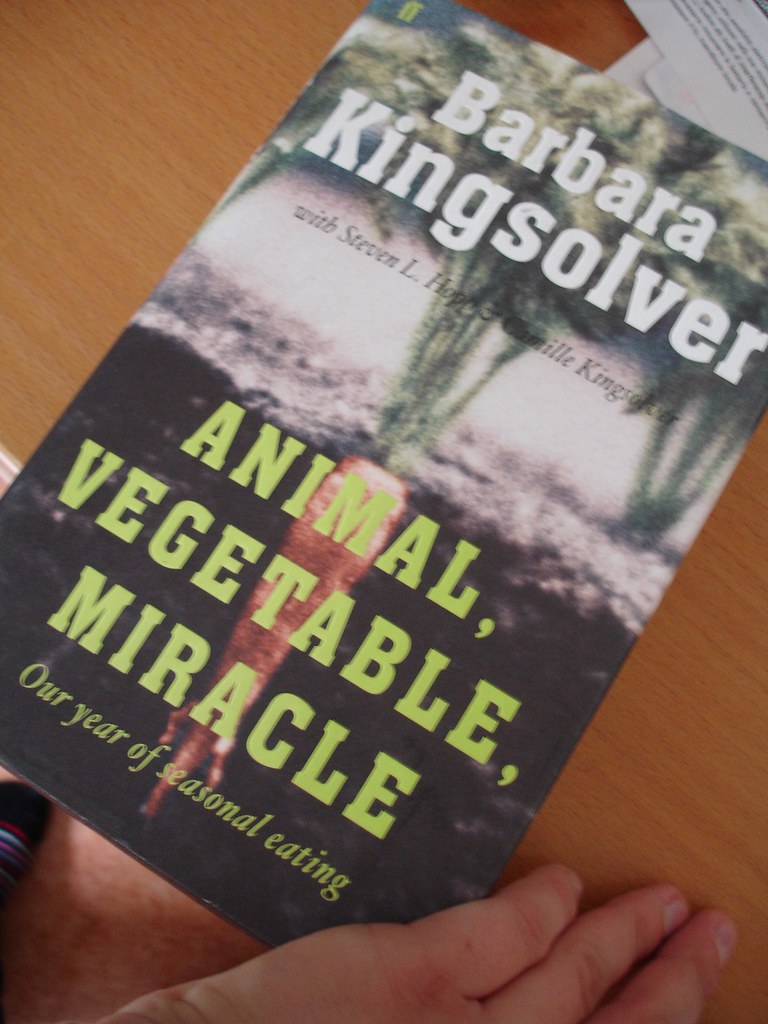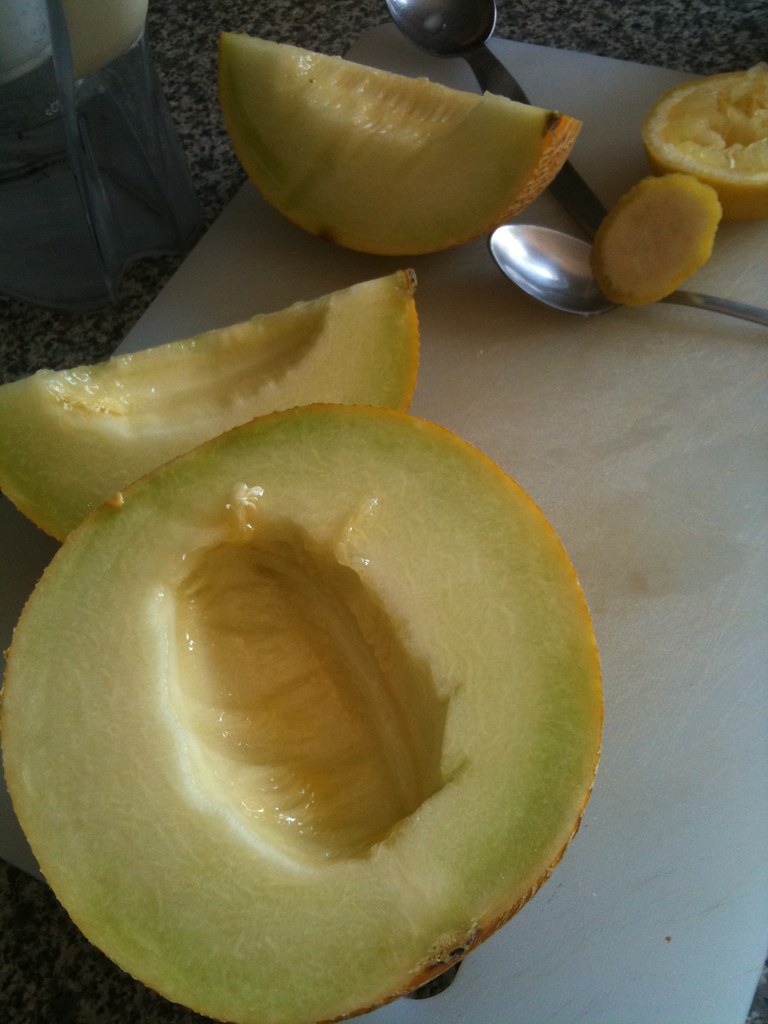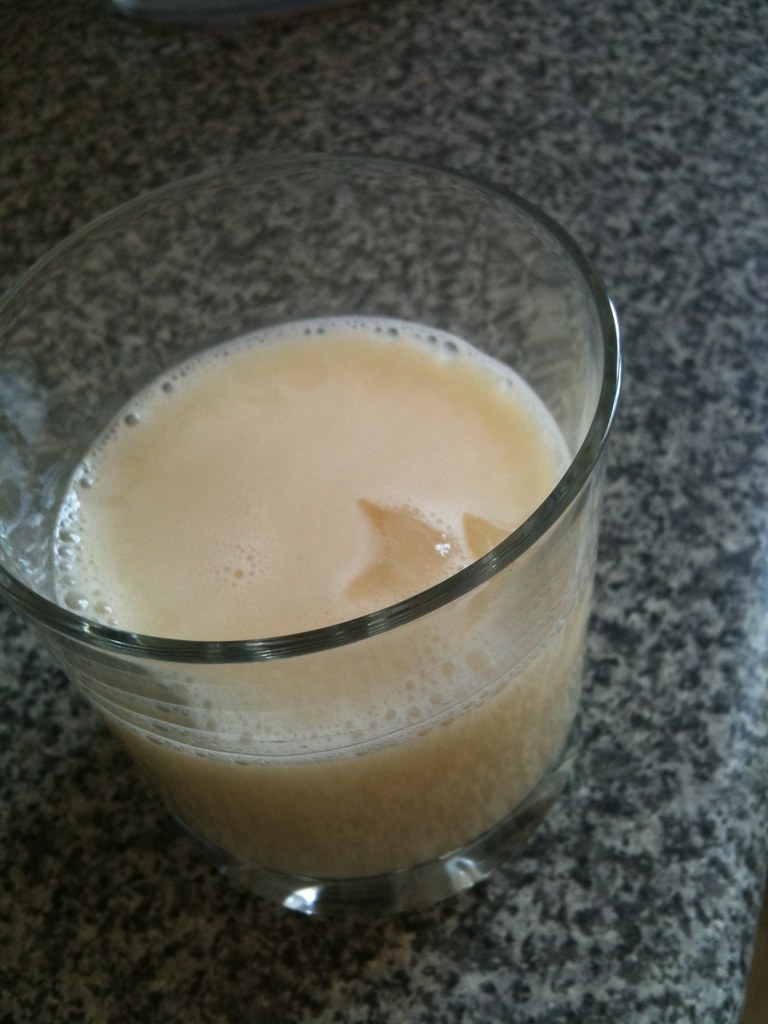Goodness me but it was fun to play with though, the mozzarella. You get to a point where you have to heat it up and knead and stretch it just like you would bread in order to develop those long stretchy strings that are characteristic. What you see above is Joy, hands protected by ice cube bags, squishing a large ball of nearly cheese...it had a fantastic texture. However, we don't think we did this bit totally right - too much kneading and not enough stretching is the theory, and definitely we need to experiment again.
The first problem we encountered when we sat down to make our cheese was how much raw material to use. The mozzarella recipe called for one gallon, that is *eight pints* of whole milk. That's a lotta milk. And it didn't tell us how much it made, either. We didn't want to be drowning in little white mozzarella balls... The ricotta recipe called for two quart, which is a little more civilised at four pints, but still. In the end we halved both recipes, which meant that we made about two of the fist sized commercial balls of mozzarella you get, and around 275g of ricotta (1 cup). Manageable amounts.
That still left us buying 6 pints of milk. Lots. Mind you, milk is hardly an expensive ingredient if you're going to play with something. But it brings home how much we as a society must use, really.
So. The ricotta is easyeasy. I don't think I'll ever buy it again, it was so easy. The recipe I used was one I clipped from a few lines on David Lebovitz's wonderful blog, that runs as follows:
Ingredients
2 pints whole milk
1 cup plain whole-milk yogurt (we used greek yoghurt and omitted the cream)
Optional: 1/2 cup heavy cream
1 teaspoon white vinegar (another recipe suggests using 2 tsp lemon juice)
½ teaspoon salt
Method
In a large pot, bring the milk, yogurt, heavy cream (if using), vinegar, and salt to a boil. Very gently boil for one to two minutes, until the milk is curdled.
(looks horrid, right?)
Meanwhile, line a strainer with a few layers of cheesecloth (we actually HAD cheesecloth, I always find it hard to get hold of - a very old very clean worn cotton/linen tea towel also works, it's usually possible to find something) and set it over a deep bowl. Pour the milk mixture into the strainer and let drain for 15 minutes. Gather the cheesecloth around the curds and squeeze gently to extract any excess liquid.
Storage: Homemade ricotta is best served slightly warm, although it can be refrigerated for up to three days, if desired.
This tasted fantastic. We ate quite a lot of it just standing there. Joy turned it into a rather lovely looking cheesecake afterwards, with raspberries.
The mozzarella recipe came from this book by Barbara Kingsolver, which looks lovely and which I will borrow from Joy at some point when I can reliably be in the same county for any length of time.
It's an American book, but lovely. The mozzarella recipe called for rennet and citric acid, which took a little finding. Big supermarkets sometimes have the rennet, as do health food shops. We pinched a little citric acid from a friend (Mr Loxley) who had been using it for making elderflower cordial, but otherwise would have resorted to the internet. Apparently it's quite hard to get hold of because it's a substance used to cut drugs with. We did not cut drugs, just cheese. Anyway. You also need a temperature probe. Joy bought one this time, I keep breaking them. Not sure what to do about that... Recipe follows:
Ingredients
4 pints fresh whole milk (not UHT or anything)
¾ teaspoon citric acid, dissolved in 50ml of cold water - used bottled, unchlorinated water
¹⁄8 teaspoon liquid rennet dissolved in 50ml cold water (again, mineral water) - we found that the VegeRen we were using seemed to have a different concentration to the stuff the recipe was apparently using, and so just had to guess. We used 30 drops in the end, which was probably too much, I'm not sure. I want to read a bit more about the enzyme action - I THINK you can probably just keep adding until it suddenly starts to curdle, because I think it's a catalysis reaction going on but I need to know more. Anyone with any ideas let me know...
1 tsp salt
Method
Heat the milk to 55 degrees Fahrenheit on the stove (not much more than it's likely to be anyway if it's just come out of the supermarket fridge) and then add the citric acid. At 88 degrees it should begin to curdle. Add the rennet and keep heating to just over 100 degrees Fahrenheit (that's body heat, folks on the metric side of the sea, not boiling point!). At this point the mixture in your pan should be proper curds and watery whey. It's meant to look like this, it's not off milk... Scoop out the curds with a slotted spoon and press them together, squeezing out and pouring off as much whey as really possible as you do so. Microwave the cheese on high for 30 seconds (the recipe says 1 minute, but we halved it, so we were guessing again at this point) and remove and knead a little to remove more whey. This can get warm, hence Joy's use of plastic bags to protect her hands in the picture above. Gloves would have been more elegant, but we didn't have any. Heat again for 30 seconds and knead. You're trying to get it to stretch a bit, so heat it once or twice more until you can get it to stretch like mozzarella should, like toffee or melted sugar at the right point. It should go shiny. We didn't do quite enough of this and have ended up with a cheese closer to paneer - perfectly edible but not really pizza or salad quality. I used half of my ball to make an uninspiring pasta bake, but am going to use the other as paneer and put it in a muttar aloo curry (pea and potato, but it sounds better like that...).
All in all great fun, and like I said the ricotta in particular is a perfect recipe. To be repeated.
